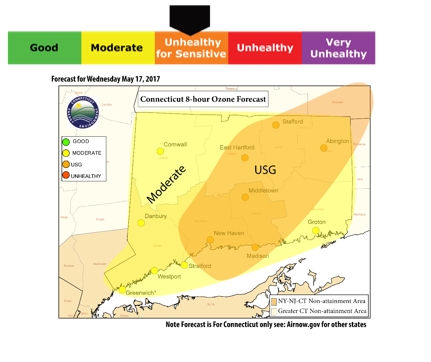Press Releases

05/17/2017
Department of Energy & Environmental Protection Forecasts Elevated Levels of Ozone for parts of Connecticut Wednesday May 17, 2017 and Thursday May 18, 2017
First alert for the 2017 ozone season
Connecticut’s Department of Energy and Environmental Protection (DEEP) is forecasting our air quality will be Unhealthy for Sensitive Groups (USG) for the New Haven coastal area through Northeastern Connecticut on Wednesday May 17, 2017 and for most of the State on Thursday May 18, 2017 – which would be the first unhealthy air day for the 2017 ozone season.
Connecticut’s Worst Predicted Air Quality for Wednesday May 17, 2017:
Health Effects of Air Pollution
When air quality is in the USG category, there is an increased likelihood that certain populations will experience respiratory symptoms and breathing discomfort. Children and people with asthma or other respiratory disease are most at risk for experiencing symptoms. Active children and adults, and people with respiratory disease, such as asthma, should limit prolonged outdoor exertion. Peak ozone levels are predicted to occur between 2-8 PM EDT so make sure you get your activity or exercise in before or after these times to minimize health effects.
Weather Summary
High pressure off the east coast this Wednesday into Thursday will produce sunny skies and a steady southwest wind. These conditions will transport air pollution from the I-95 corridor into the state over the next two days. The clear and sunny weather will enable additional transported and homegrown air pollutants to mix in the atmosphere and form a secondary pollutant, ground-level ozone, which will also contribute to poor air quality along the I-95 corridor and into southern New England.
What You Can Do to Help
When air pollution levels are predicted to be “unhealthy for sensitive groups” DEEP recommends:
- Conserving electricity by setting air conditioners to 78 degrees;
- “Wait ‘til 8” to use energy intensive appliances like washing machines, dryers and dishwashers;
- Refueling your lawn mower and cutting the grass before noon;
- Driving less by carpooling, vanpooling or using public transit;
- Telecommuting if possible;
Refueling your vehicle after dusk and never idling a vehicle unnecessarily; and - Refraining from recreational wood burning.
We also need long term actions to get to the root of our air pollution problem in Connecticut. DEEP recommends you also consider these long-term energy reducing strategies:
- Make your home or business as energy efficient as possible – this drives down air pollution and puts money back in your pocket;
- Cars and trucks cause over half our air pollution, so consider driving an electric vehicle; and
- Consider investing in renewable energy like solar electric.
Knowledge is power! Ask your school if they participate in the School Flag Program, EPA’s Air Quality awareness tool that uses colored flags based on the AQI to notify teachers, students, administrators and the local community of air quality conditions.
Stay connected and access the daily AQI forecast and real-time air quality data:
- Follow us on Twitter
- Sign up to get Air-Quality alerts through Enviroflash
- Visit DEEP’s AQI webpage or call 800-249-1234
- Go to EPA’s AIRNow web page
- Download EPA’s AIRnow app for your phone
- Ozone Monitoring Season
DEEP monitors, tracks and forecasts daily air quality levels across Connecticut for ozone from May 1 through September 30 each year and for fine particulate matter (PM2.5) each day of the year. On April 28, 2017, DEEP began informing Connecticut’s regulated community and the general public of the ozone season via the State of Connecticut E-mail list serve and posting air quality forecasts on the DEEP web page, available here.
DEEP encourages daycare providers, summer camps and elder/senior centers to subscribe to the Air Quality Index (AQI). Subscribing to the AQI is fast and easy and will provide you with important information each day about Connecticut’s air quality through the spring and summer. The AQI link provides facts and information regarding ground-level ozone, its health effects, what today on high ozone day, and most importantly what you can do to help reduce ground level ozone in your backyard.
- Twitter: @CTDEEPNews
- Facebook: DEEP on Facebook


